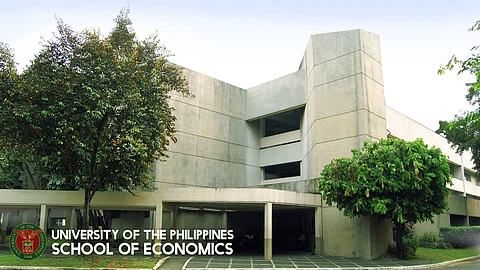
- NEWS
- the EDIT
- COMMENTARY
- BUSINESS
- LIFE
- SHOW
- ACTION
- GLOBAL GOALS
- SNAPS
- DYARYO TIRADA
- MORE

A group of economists at the University of the Philippines was called anti-poor for voicing fierce opposition to Congress' push to lift the economic restrictions of the 1987 Constitution, which are believed to generate thousands of jobs for Filipinos.
On Monday, Cagayan de Oro Rep. Rufus Rodriguez, chairperson of the House committee on constitutional amendments, took a swipe at economic experts from his alma mater, UP, for their "fault-finding" outlook on Congress' renewed push for a Charter change, which he claimed undermines the legislative body's long-standing effort.
"They should not oppose just for the sake of opposing," he said.
"This group is anti-development, anti-employment, anti-economic progress, and anti-poor. They are trying to block economic Charter reforms which we believe will bring in more foreign direct investments (FDIs), which in turn will accelerate our country's economic development, and create more job and income opportunities for our people," Rodriguez lamented.
UP's School of Economics recently released a position paper stipulating that proponents of Cha-cha should attend to pivotal factors affecting FDIs, including infrastructure, connectivity, corruption, and the rule of law in lieu of amending the 37-year-old Constitution.
The discussion paper mentioned that while the Constitution's restrictive equity may hinder FDIs, its potential effects are insignificant compared to other explanatory variables, including the ease of doing business, physical infrastructure, and perceived corruption.
Rodriguez, however, countered that Congress has been addressing other investments-related issues by passing the necessary laws, including the recently enacted Ease of Doing Business Act, the corporate income tax reduction, and the grant of different tax incentives.
Furthermore, Rodriguez, who obtained an AB Economics degree at De La Salle University, contended that economic proposals in the Charter and other factors affecting investments are not mutually exclusive and could be addressed together.
"I do not agree that the other ingredients for attracting investments are more important than removing foreign equity restrictions in the Charter. These limitations are the root cause of the reluctance of foreign businesses to invest in our country," he stressed.
Several experts believe that economic growth could be attained without tinkering with the Constitution if the government concentrates on enforcing current laws and combating corruption.
In March, the House of Representatives approved on final reading the Resolution of Both Houses 7, which aims to eliminate foreign ownership constraints in public utilities, educational facilities, and the advertising industry of the Constitution, which are said to be hampering the Philippine economic potential.
RBH 7 mimics the Senate's RBH 6, with the only distinction being the manner of voting.
Senate President Juan Miguel Zubiri said the upper chamber still has three more hearings left on RBH 6 but vowed they are "on track."
